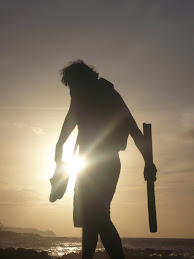Ice crystals dance & shimmer in swirling eddies through the dry, achingly cold air.
The dirty sweet smell of burnt coal dust freezes to the inside of your nose, while the sun blazes through the filmy haze which coats Ulaanbaaar at the end of the Mongolian winter. Minus 13C days are a far cry from the dusty-hot 30C days of only 7 months ago - it is one thing to talk about the harsh colds of the steppe, quite another to experience it - and the locals tell me it is warming up to Spring!
 photo: view from the 'Happyness Hotel' (Voyager Hotel)
photo: view from the 'Happyness Hotel' (Voyager Hotel)
The smokey hotel room from which I peer out into the cold feels like home, and I can still vividly remember how luxurious it felt to come back to last year, compared to the spartan (but cozy)
ger accommodations in Tosontsengel and the Gobi. Even the Monty-Pythonesque breakfast shenanigans are comfortingly homely; I don't bother to order because I will be brought whatever the cook feels like making, usually a fried egg, a couple pieces of fried baloney-like sausage, and a salad (garnish) of cucumber or tomato, or both if i'm lucky.
I am waiting for my hosts to pick me up in our brand-new-used 4WD, which has spent the morning being registered, insured, and having new tires swapped in, before we begin the long trek west to Bayan Ulgii; funding was only cleared yesterday for the procurement of our vehicle. [Special note of thanks here to the
Canadian Food Grains Bank, who has generously provided the majority of funding for the
Bayan Ulgii SEAL project]. Our support team is determined, have already proven to be resourceful, and are all itching to get started.
 photo: friable, unfrozen topsoil full of organic matter
photo: friable, unfrozen topsoil full of organic matter
Discovered a minor miracle yesterday, which still astounds me: despite the pervading subzero freeze, the patches of soil underneath the conifer saplings growing in front of
ADRA's offices are friable, unfrozen, and full of organic matter. And here I was, scratching my head about how we were going to find enough un-frozen soil to build a demonstration compost heap during the course - this discovery bodes well and suggests that we should be able to find the resources in Bayan Ulgii to build one, despite the harsh conditions. Time will tell.
 photo: passive solar greenhouse growing vegetables year-round in Ladakh
photo: passive solar greenhouse growing vegetables year-round in Ladakh
photo credit: solargreenhouse.org
Another minor miracle yesterday: the Technical Coordinator of the NGO
Groupe Energies Renouvelables Environnement et Solidarités (
GERES) caught wind of our blog, and invited us to visit their
Passive Solar Greenhouse Research & Development Site on the outer districts of Ulaanbaatar (thank you Anne!). They are working in partnership with the group
Caritas France, and are developing passive solar greenhouse designs adapted for the extreme Mongolian conditions, with a target of building 180 greenhouses in the next 2 years.
Our team is excited about exchanging ideas & resources with this project, because extending the short growing season with solar-passively heated greenhouses will greatly support food security initiatives throughout Mongolia ...and the possibility of growing crops year-round - without having to burn more precious fuel to keep the greenhouse warm enough - could be a game-changing advancement.
Stay tuned.
 image: Mongolian Permaculture 2010, we ate this. I'm not kidding. see for yourself here.
image: Mongolian Permaculture 2010, we ate this. I'm not kidding. see for yourself here.















